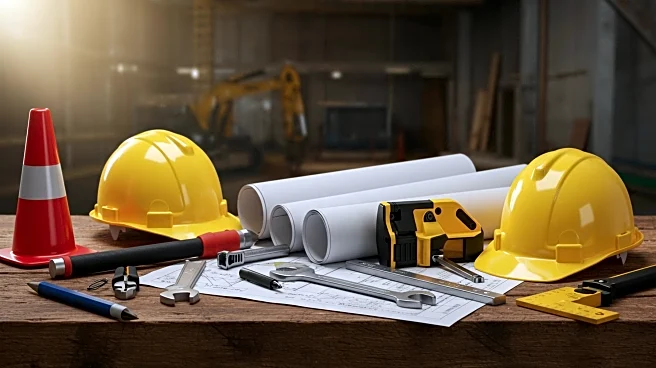What's Happening?
The U.S. construction industry is grappling with increased uncertainty due to fluctuating international trade tariffs. These tariffs, which can change unpredictably, are affecting the cost of essential materials, disrupting supply chains, and impacting project timelines. Recent trade developments, such as the new framework between the United States and the European Union, have introduced a baseline 15% duty on most EU goods, including critical components for construction. Additionally, tariffs on imports from China, Mexico, and Canada, including a 25% tariff on steel and aluminum, have further increased material costs. The industry is responding by incorporating tariff-specific escalation clauses into contracts to manage these risks.
Why It's Important?
The volatility in tariffs poses significant challenges for the U.S. construction industry, affecting profitability and stability. As tariffs increase the cost of materials like steel, aluminum, copper, and lumber, construction companies face financial exposure and potential delays. This situation necessitates proactive contract strategies to mitigate risks, such as price-adjustment clauses and material substitution. The broader impact includes potential cost increases for consumers and delays in infrastructure projects, which could affect economic growth and employment in the sector. Companies must navigate these complexities to maintain competitiveness and manage financial risks effectively.
What's Next?
The construction industry is likely to continue adapting its contract strategies to address tariff-related uncertainties. This includes revising bid documents to include tariff-specific language and exploring alternative sourcing options. As the U.S. government considers new tariffs on materials like copper and lumber, companies may need to further adjust their procurement strategies and project timelines. Stakeholders, including contractors and suppliers, will need to collaborate to find solutions that minimize financial strain and ensure project continuity. The industry will also monitor ongoing trade negotiations and potential new tariffs that could impact material costs and availability.
Beyond the Headlines
The ongoing tariff volatility highlights the need for the construction industry to rethink risk allocation and contract provisions. Legal strategies, such as change in law clauses and force majeure language, are being scrutinized to offer better protection against unforeseen government actions. These developments may lead to long-term shifts in how contracts are structured, emphasizing flexibility and risk-sharing. Additionally, the industry may see increased advocacy for stable trade policies to reduce uncertainty and support sustainable growth.










